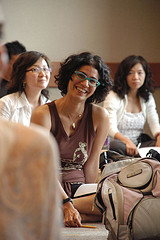 Nearly 15 years ago, Stephen R. Covey first published his #1 National Bestseller The 7 Habits of Highly Effective People If you are one of the few people that haven’t read it (or if you read it so long ago that you don’t remember it), he presents a holistic, integrated, principle-centered approach for solving personal and professional problems. My favorite of his “7 habits” is one he calls “Sharpening the Saw.” He introduces this habit with the following story:
Nearly 15 years ago, Stephen R. Covey first published his #1 National Bestseller The 7 Habits of Highly Effective People If you are one of the few people that haven’t read it (or if you read it so long ago that you don’t remember it), he presents a holistic, integrated, principle-centered approach for solving personal and professional problems. My favorite of his “7 habits” is one he calls “Sharpening the Saw.” He introduces this habit with the following story:
Suppose you were to come upon someone in the woods working feverishly to saw down a tree.
“What are you doing?” you ask.
“Can’t you see?” comes the impatient reply. “I’m sawing down this tree.”
“You look exhausted!” you exclaim. “How long have you been at it?”
“Over five hours,” he returns, “and I’m beat! This is hard work.”
“Well, why don’t you take a break for a few minutes and sharpen that saw?” you inquire. “I’m sure it would go a lot faster.”
“I don’t have time to sharpen the saw,” the man says emphatically. “I’m too busy sawing!”
Covey contends that we must take care of the single most powerful investment we can ever make in life — investment in ourselves. “We are the instruments of our own performance,” he explains, “and to be effective, we need to recognize the importance of taking time regularly to sharpen the saw.” He’s talking about taking time for self-renewal. He outlines four dimensions that need balanced renewal:
- physical (exercise, nutrition, stress management)
- mental (reading, visualizing, planning, writing)
- social/emotional (service, empathy) and
- spiritual (value clarification and commitment, study and meditation).
Covey tells us that “Renewal is the principle — and the process — that empowers us to move on an upward spiral of growth and change, of continuous improvement Moving along the upward spiral require us to learn, commit and do on increasingly higher planes.”
Building a Learning Organization
Individuals aren’t the only ones who need to constantly seek movement on this upward spiral — organizations need to create a culture that expects continuous improvement through renewal. The most successful organizations are ones that build a learning organization, committed to focusing its members on enhancing and expanding their collective awareness and capabilities.
In The Fifth Discipline Fieldbook, the authors delineate five core disciplines of a learning organization. These disciplines are lifelong programs of study and practice. They are:
Personal Mastery – learning to expand our personal capacity to create the results we most desire, and creating an organizational environment which encourages all its members to develop themselves toward the goals and purposes they chose.
Mental Models – reflecting upon, continually clarifying, and improving our internal pictures of the world, and seeing how they shape our actions and decisions.
Shared Vision – building a sense of commitment in a group, by developing shared images of the future we seek to create, and the principles and guiding practices by which we hope to get there.
Team Learning – transforming conversational and collective thinking skills, so that groups of people can reliably develop intelligence and ability greater than the sum of individual members’ talents.
System Thinking – a way of thinking about, and a language for describing and understanding, the forces and interrelationships that shape the behavior of systems.
Taking Action
The Wunderlin Company embraces all these disciplines as it goes about the process of building a learning organization. Like Covey suggests, we believe in the need for continued learning — the need to learn, commit and do on increasingly higher planes. We are always on the lookout for ways to expand our own knowledge base. At least once a year, all the folks who do work for The Wunderlin Company gather to teach each other about new facets of our work. It always proves rejuvenating — it keeps our mental saws sharp!
One of the ways that you can “sharpen your mental saw” is through professional development. We offer a number of focused professional development workshops in facilitation, Myers Briggs, and Coaching as a Leadership Skill.


Leave a Reply